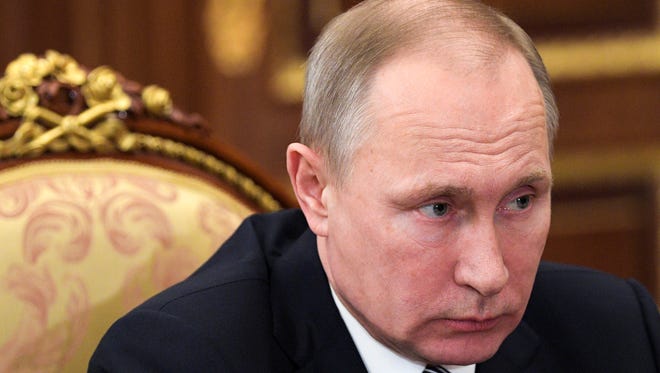Trump bows to Russia again: Max Boot
Republicans once scorned 'moral relativism,' but now they defend it.

Once upon a time, “moral relativism” — the tendency to draw comparisons between the conduct of the United States and its enemies — was the bane of American conservatives.
In his famous 1983 speech to the National Association of Evangelicals, President Reagan said, “I urge you to beware the temptation of ... blithely declaring yourselves above it all and label both sides equally at fault, to ignore the facts of history and the aggressive impulses of an evil empire.” Reagan’s ambassador to the United Nations, Jeane Kirkpatrick, wrote, “There is no more misleading concept abroad today than this concept of … superpower equivalence.” In 2011, Rep. Paul Ryan, not yet speaker of the House, said, “If you ask me what the biggest problem in America is, I’m not going to tell you debt, deficits, statistics, economics — I’ll tell you it’s moral relativism.”
And throughout the Obama administration, conservatives excoriated the president for supposedly apologizing for past American actions such as the nuclear bombing of Japan — and for not doing enough to champion the doctrine of “American exceptionalism,” which holds that the U.S. is different from, and implicitly better than, ordinary nations. In 2015, for example, then-Gov. Bobby Jindal of Louisiana complained: “This is … maybe the first president ever who truly doesn’t believe in ... America as a force for good.”
So it is more than a little ironic that the chief font of moral equivalence today is a Republican president who has the support of many conservatives — including Ryan and Jindal. President Trump has no problem trashing allies such as Australia and Mexico or bad-mouthing NATO and the European Union. But he will never say a bad word about Russian dictator Vladimir Putin.
Slapdash Trump order ignores real danger: Max Boot
Will Trump's America be a nation of ugly self-interest and ignorance? Column
The latest manifestation of Trump’s disturbing bromance with Putin came in his Super Bowl Sunday interview, in which he once again touted the virtues of “getting along with Russia.” Bill O’Reilly challenged him: “He’s a killer, though. Putin’s a killer.” Trump was nonplussed: “There are a lot of killers. We’ve got a lot of killers. What, you think our country’s so innocent?” This is no slip of the tongue — it is a repeat, virtually word for word, of comments that Trump made in December 2015 on Morning Joe. When Joe Scarborough said Putin "kills journalists,” Trump insouciantly replied, “Well, I think that our country does plenty of killing, too, Joe.”
Putin presides over a regime that routinely murders anyone with the temerity to criticize him. A partial list of his suspected victims includes Alexander Litvinenko, a former Russian intelligence officer whose tea was doctored with radioactive polonium-210, killing him in London in 2006; investigative reporter Anna Politkovskaya, gunned down in front of her Moscow apartment in 2006; attorney Sergei Magnitsky, killed in police custody in 2009; and the opposition leader Boris Nemtsov, shot to death by mysterious assailants in 2015 within spitting distance of the Kremlin. Just a few days ago, Kremlin critic Vladimir Kara-Murza suffered massive organ failure, just he had in 2015, with the widespread suspicion being that he was poisoned on both occasions by the FSB, Putin’s secret police.
Trump's prayer for Schwarzenegger: Column
POLICING THE USA: A look at race, justice, media
Does Trump mean to imply that the FBI also kills anyone who dares to voice dissent just as the FSB does? The FBI has certainly harassed and wiretapped anti-war and civil rights demonstrators in decades past, but even then it never actually killed anyone. The implication is as ludicrous as it is offensive. Yet it is of a piece with Trump’s non-stop denigration of America, which he described in his inaugural address as a land of “carnage” in which crime is out of control, “rusted out factories” are “scattered like tombstones across the landscape of our nation,” and “our young and beautiful students (are) deprived of all knowledge.” Of America’s many achievements, including our traditions of freedom and openness to immigrants, he predictably had not a word to say.
If such “hate America” sentiments had been uttered by a Democrat — say, Barack Obama — you can be assured that every conservative talking head and politician in the land would be rushing in front of a Fox News camera in a white rage. But when Trump does it? A few do protest, but not nearly enough. Vice President Pence won’t even say America is morally superior to Russia. By not doing more to distance itself from this morally obtuse president, the Republican Party is becoming, de facto, the party of moral relativism. If only Paul Ryan were alive to see this.
Max Boot, a member of USA TODAY's Board of Contributors, is a senior fellow at the Council on Foreign Relations. Follow him on Twitter @MaxBoot.
You can read diverse opinions from our Board of Contributors and other writers on the Opinion front page, on Twitter @USATOpinion and in our daily Opinion newsletter. To submit a letter, comment or column, check our submission guidelines.